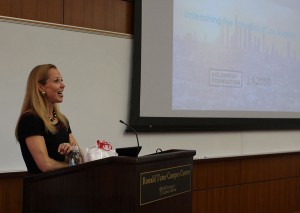Foundation head discusses philanthropy
On Wednesday afternoon, the Brittingham Social Enterprise Lab hosted Tara Roth, president of the Goldhirsh Foundation, to speak at the institution’s monthly Lunch and Learn series.

Human capital · Tara Roth, president of the Goldhirsh Foundation, said her organization aims to turn people’s ideas into reality. – Christine Yoo | Daily Trojan
The Goldhirsh Foundation is an organization that seeks out emerging innovations and ideas in order to help grow and build other organizations. In 2013, it launched its LA2050 Grants Challenge to impact the future of Los Angeles. Roth has been working with the Goldhirsh Foundation for the past eight years.
“We are coming up with ideas on how to invest in the best way possible,” Roth said.
One way in which the foundation aids the organizations it invests in is through helping them with branding and marketing.
“We take people’s ideas and programs, and we try to make an articulate story about what they are doing,” Roth said. “We look at what brand that they are communicating and what the narrative is that they are projecting. Something that may not be the most interesting or the most riveting, we try presenting in a very compelling way.”
In addition to the economic capital and social capital the foundation focuses on, Roth said they also support organizations with human capital, even serving on the advisory board if needed.
Roth said one thing that’s helped her in her position was her previous experience working with the California Charter Schools Association, during which she was at the other end of these transactions.
“Anyone who is ever giving away money should have always learned to ask for money before,” she said.
Roth also spoke about how the direction of the Goldhirsh Foundation has changed under its new initiative called LA2050. LA2050 is a two-year-old grant challenge through which the Foundation gives away 10 grants of $100,000 each year to organizations that work towards developing and improving L.A.
“We want LA2050 to be understood and owned by the Los Angeles community,” Roth said.
Roth said LA2050 came out of a strategic planning process that looked at Los Angeles today and projection for the city’s future. LA2050 is meant to address any setbacks that were projected.
Roth discussed different ways Los Angeles could improve and positives already happening in the city.
“We have one of the lowest high school graduation rates, we are the homeless capital of the United States,” Roth said. “But we do have good things as well, of course. For every one artist moving out we have two moving in, and our water consumption is the lowest it has been in 20 years.”
In its first two years, the LA2050 Grant Challenge has proven to be a success.
Roth said there were 279 submissions, the majority of which were collaborations from different organizations, and over 70,000 votes from the public. Winners were determined based on both votes from the public and votes from a panel of judges.
“In a city where the voting population is only slightly higher than [participation votes for LA 2050], we are proud of the amount of engagement we saw from the community,” Roth said.
The reason for high participation numbers could be that, according to Roth, the Grant Challenge appealed to several characteristics common among Angelenos.
“We found that Angelenos really want to collaborate, they are very entrepreneurial,” Roth said. “There is a hunger for innovation and dreaming big to make the future a better place for ourselves, for our children and for our grandchildren.”
Attendees, who filled the room, found Roth’s insight into philanthropy helpful.
“Roth was very inspirational and got me excited about L.A. and all the programs in place,” said Amber Lu, a member of USC’s Startup GenYrator, a crowdfunding platform for USC entrepreneurs.
Roth’s talk also appealed to students who might be asking for money from the businesswoman in the future.
“I thought she was totally on point and really described what the Foundation is doing well,” said Michael Shackel, a master’s student studying social work. “To hear from a funder what they are looking to do is helpful, and it is helpful from a business perspective.”


Great article Shayla – it was nice meeting you yesterday at the event!